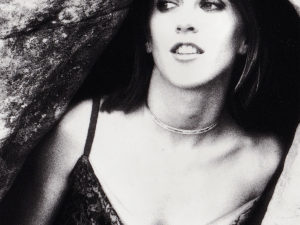By Brian Orloff
St. Petersburg Times, October 8, 2005
Singer Liz Phair has no problem accepting the set of contradictions she embodies. And she’ll admit as much.
“Pretty much if there’s an opposite tack to what’s going on, well, that’s me,” she said, laughing on the phone from Chicago about her tendency to do things that are decidedly not in vogue.
An original indie rocker – her explosive 1993 album Exile in Guyville remains a modern classic – Phair has distanced herself from that community just when it’s hotter than ever given the success of bands like Arcade Fire and Bright Eyes. Since releasing her self-titled album in 2003, Phair, 38, has courted a mainstream audience with poppier melodies and a sexed-up image, polarizing longtime fans who criticized her for abandoning her indie cred.
But Phair revels in the face of those expectations. She’s a feminist who poses for scintillating photos, an academic at heart (Phair attended Oberlin College) and whose chosen career is rock ‘n’ roll.
Phair is turning the tables again on her latest album – her fifth – Somebody’s Miracle. Renowned for her sexual candor – some would say potty mouth – Phair reins herself in, focusing on topics such as seeking commitment and addressing her flaws as a mother and partner. Sure, there’s flirtation, and wit too, but Phair’s settled for a more mid tempo, contemplative vibe.
In other ways she has stayed true to her roots. Phair modeled Somebody’s Miracle as a musical conversation with Stevie Wonder’s touchstone Songs in the Key of Life; her album Exile in Guyville was a song-by-song response to the Rolling Stones’ Exile on Main Street.
Phair will offer new and old material when she plays Jannus Landing tonight. But first, she called to chat about her new album and her sexual politics.
On this album you continue your introspective writing in ways that are pretty insightful but also self-deprecating.
Because (listening to) Stevie’s record kicked my ass so hard that it humbled me to a great extent, with this record I figured something out which I intuitively knew but I would waver from: If you depict your own personal struggle in a very specifically personal way, it can speak more broadly than if you try to make your words more broad. I think on this record I challenged myself to try to give of the things of my life that aren’t pretty.
You’re talking about broken relationships and finding a successful long-term relationship. Are you at a place where you’re taking stock of those things?
I think so. It’s like age of wisdom rather than passion of youth. It’s looking at the totality of my life. I mean there’s a certain point at which you can’t blame other people and you start to come to terms with your own shortcomings. What I like about this record so much is that there’s a forgiveness – for other people’s faults but also for myself. It’s like, “Here’s where I’ve failed. Or here’s what I’m going to do about it.”
You’ve always written about sexuality with bravado and candor, but I think on this album, that’s restrained a bit.
Yeah, this record is different because as you can tell on the song Somebody’s Miracle it’s about what happens when you make a commitment and try to stick to that – what happens when you’re seeking something other than in-the-moment gratification. And the song that most embodies sexuality on this record to me is actually “Everything (Between Us)”. There’s sensuality rather than a sexuality to the lyrics of that song. That to me typifies the sexuality on this record. It’s a little bit deeper. It’s committed to a person. It’s just talking about intimacy. So maybe this record is more about intimacy.
How do you feel now as part of a pop culture that’s becoming increasingly sexualized?
I’ve always felt very comfortable, especially after having a child, expressing my sexuality. Before there was a defensiveness about it or a confrontational-ness about it, but nowadays it would be easy for me to just express myself sexually, like in photo shoots or whatever.
And once you kind of master the stairs, and get that sense of yourself as a woman, I start to look around and it’s like, “God, it’s depressing how many images of scantily clad women are everywhere.” Part of me starts to think, “Doesn’t this mean something?”
And I start to get that creepy sense, and I start taking a critical look at this and think, “What’s my place in this? How do I contribute or counteract and/or fall prey to it?” I think it’s an open topic for me now. I definitely feel there’s a lot of pressure to just sell that, especially if you’re female, and just to use that, especially if you’re male. It could be as simple as just biology, like that’s just what we do by reaching for the basest, easiest way to trigger somebody. But at the same time, I really feel like it is currently in my head – and that’s not from a place of not being comfortable doing it. I enjoy doing it, actually.






